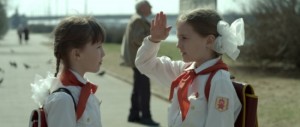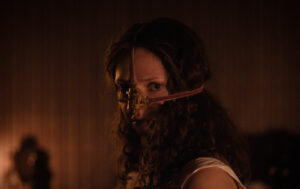Pioneer Heroes

Nizhny Novgorod, 1987: a class of schoolchildren are practising a rendition of the Soviet heroes’ song Oh Fields, My Fields. Among them are the detached Sergeyev – who is more absorbed in inventing an anti-death pill than singing the lead – loyal and plucky Katya, and Olga, who dreams of the glory of snaring a spy. All three are on the cusp of entering the revered Pioneers Organisation, the Soviet equivalent of the Scouts.
The film shifts between charismatic childhood scenes to the same three friends 25 years later in modern-day Moscow. On the surface of things, all three represent a level of career and monetary prosperity out of reach to many young Russians, but the alienation of big city life has had its effects. Sergeyev has used his powers of absorption to become a successful writer, but is lacking in any kind of emotion. Olga, a successful actress, is battling panic attacks brought on by navigating Moscow’s public transport system. Katya is now an event organiser, showcasing “pricey junk to rich people”.
When searching for a key theme in Pioneer Heroes, the childhood scenes provide the best clues. Katya is burdened by contradicting duties as a pioneer. Should she inform on her uncle, who is using the family kitchen to illegally distil vodka? This leads her, in dreams as well as in real life, to the police. Recurring dream scenes of her walking among portraits of the esteemed first pioneers are wonderfully visual in their symbolism of the desire to do good deeds and belong, but are a tad heavy-handed as a constant reference point. Sadly, the Katya of 1987 does not harmonise with her present-day incarnation. The audience learns next to nothing about Katya, who appears to be a vapid, well-dressed 30-something, and whose fears are only briefly touched on in a scene with Olga, where she describes her horror after having observed the “inhuman” reality of a woman being operated on.
If the past is played out in a warm haze, then contemporary Moscow is a lonely, impersonal place. A lack of obvious plot causes potentially interesting and character-developing side stories to fall flat. Olga makes some interesting and surprising admissions to her therapist about her sexuality and childhood fantasies; Katya’s involvement with a married man we hear of, and witness just once. Sergey, whose character is most in keeping with his younger self, is saturated in his job at the cruel expense of any affection towards his girlfriend.
The bigger problem here is not that the film is unwatchable. There is much to be enjoyed, and special commendation is deserved to the composed cinematography of Ruslan Gerasimenkov. There is, however, not enough to redeem the film as a coherent whole, made worse by a racially prejudiced final scene. Kudryashova, to her credit, has taken on a sizeable subject, but as of yet hasn’t developed the tools to explore in enough depth the validity of her characters as adults.
Rosie Boys
Pioneer Heroes does not yet have a UK release date
Read more of our reviews and interviews from the festival here
For further information about Berlin Film Festival 2015 visit here.

























Facebook
Twitter
Instagram
YouTube
RSS